The Public Health Agency of Canada recently announced funding for Green Communities Canada (GCC) and its partners to lead a four-year nationwide School Streets initiative. The National Active School Streets Initiative (School Streets) aims to address a lack of physical activity in children by improving road safety conditions surrounding schools and increasing rates of active school travel and independent play. The initiative is a cross-country collaboration between not-for-profit organizations (GCC, 8 80 Cities, Centre d’écologie urbaine), research institutions (University of Montréal, University of British Columbia, Queen’s University, Toronto Metropolitan University), and 16+ community partners spanning six provinces (British Columbia, Alberta, Manitoba, Ontario, Quebec, and New Brunswick). The program will include matched funding and community in-kind contributions, totaling a $6 million investment in children’s physical activity.
“In communities across Canada, there has been an alarming decline in the number of children walking and cycling to and from school,” says Jared Kolb, Interim Executive Director at GCC. “Interventions like School Streets help to create safer and more walkable environments in front of schools, and in turn, support increased physical activity and well-being for children, their families, and the broader community.”
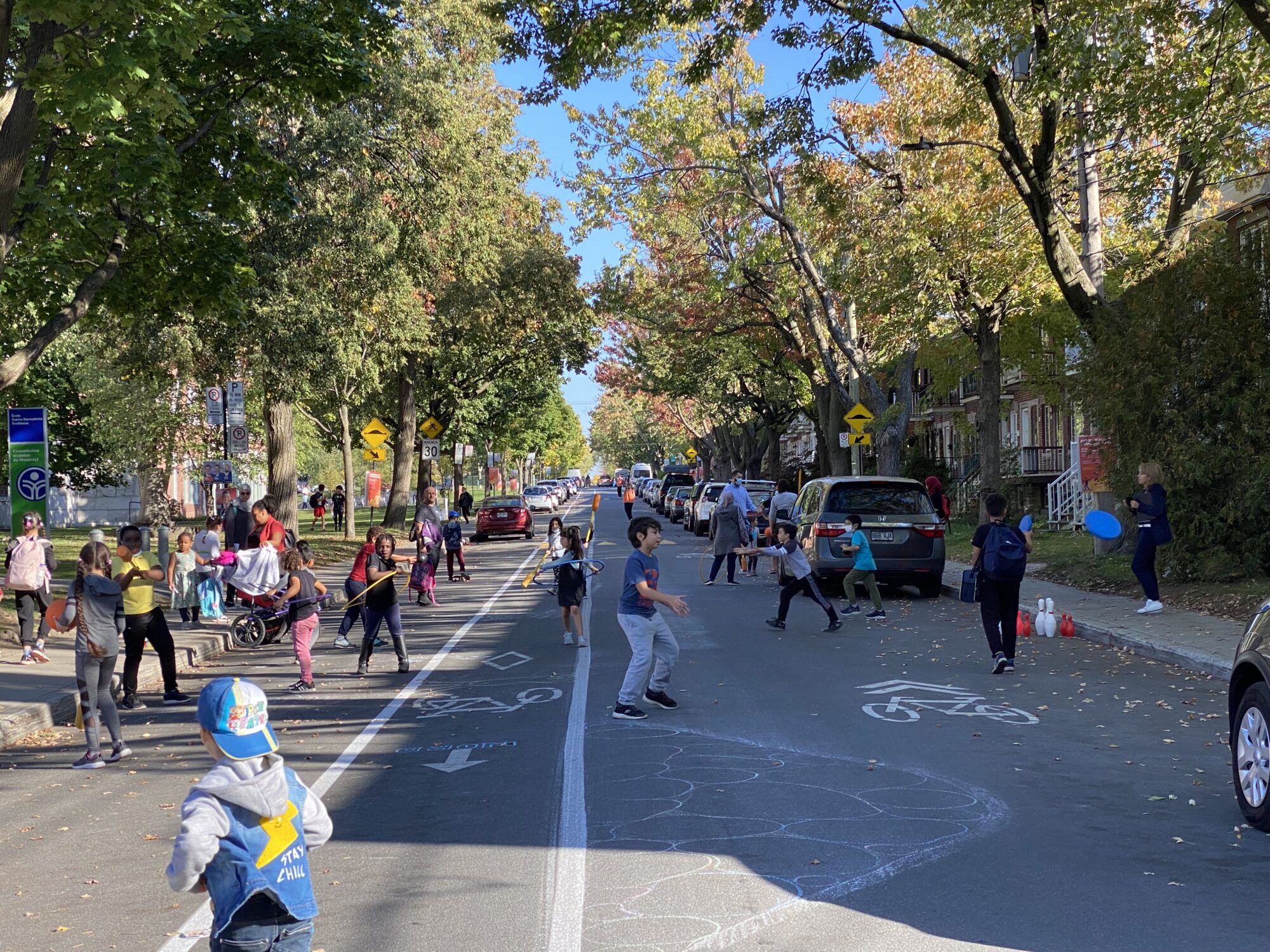
Children playing in the École Sainte-Bernadette-Soubirous School Street/rue-école in Montréal (photo by: Centre d’écologie urbaine)
What are School Streets?
The School Streets program uses temporary barricades and road closure signage to create car-free spaces in front of schools, allowing children to pursue active free play opportunities at the start and/or end of the school day. These interventions will range from a one-day pop-up event to a one-year project and will be tailored to the local context of each participating community.
Previous School Streets
In 2021, School Streets pilot projects were implemented in various communities across Canada. Green Communities Canada and 8 80 Cities partnered to lead the Ontario School Streets Pilot (OSSP) program, in which five School Streets were completed across four Ontario cities – Hamilton, Mississauga, Kingston, and Markham. In the same year, the Centre d’écologie urbaine, University of Montréal, and Queen’s University co-led the Levelling the Playing Field program, in which two School Streets were implemented in Montréal and Kingston. Since 2021, the City of Vancouver has also organized School Streets and led interventions in eleven schools. This national School Streets initiative builds upon the findings, successes and momentum of these previous projects and spearheads the delivery of additional projects across the country.
Project Details
The 16+ community partners will participate within one of three streams – as a Level-Up community, Pilot community, or Aspiring community. The goal of Level-Up communities is to deepen the impact of their previous School Streets initiatives by delivering approximately two full-year interventions. Extensive evaluation will be done in Level-Up communities to analyze the impact of School Streets projects, particularly on underrepresented communities.
Pilot communities will broaden the impact of School Streets in areas that have demonstrated some existing readiness or previous experience. Pilot communities will aim to deliver two one-month interventions, with the goal to increase community capacity for coordination, test new approaches, and evaluate the impact in different social and geographic contexts.
Aspiring communities will build momentum for School Streets initiatives in areas that have no previous implementation experience. Communities with demonstrated readiness will deliver short pop-up interventions spanning approximately one-week.
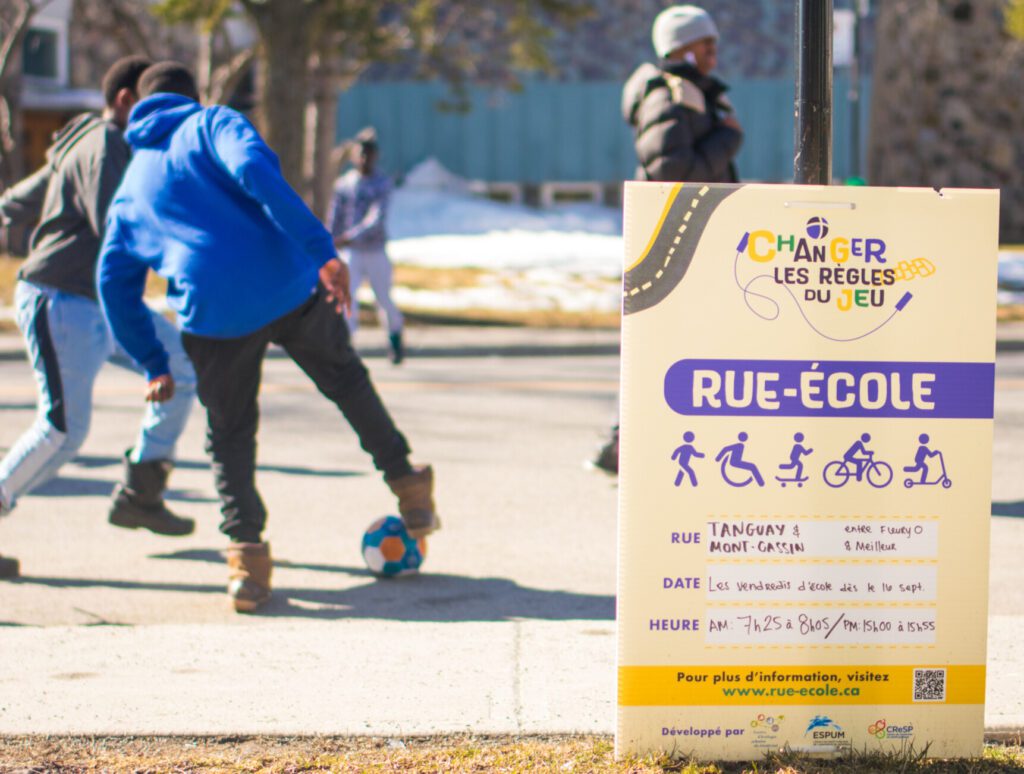
Children playing in the École Saint-Benoît School Street/rue-école in Montréal (photo by: Centre d’écologie urbaine)
Training
Participating communities will benefit from a national Community of Practice, tailored training program, and direct technical support through cohort meetings. This training will be led by technical partners, 8 80 Cities and Centre d’écologie urbaine, and will be accompanied by a range of training materials to help share knowledge, troubleshoot implementation challenges, and accelerate School Streets uptake.
Engagement
With guidance from the available training supports, community partners will engage and educate community stakeholders, undertake participatory planning activities, build local alliances, and increase capacity for implementation. Partners will also collaborate directly with equity-deserving groups, municipal representatives, and school actors to help identify suitable School Streets sites, determine local priorities, and build capacity to support implementation.
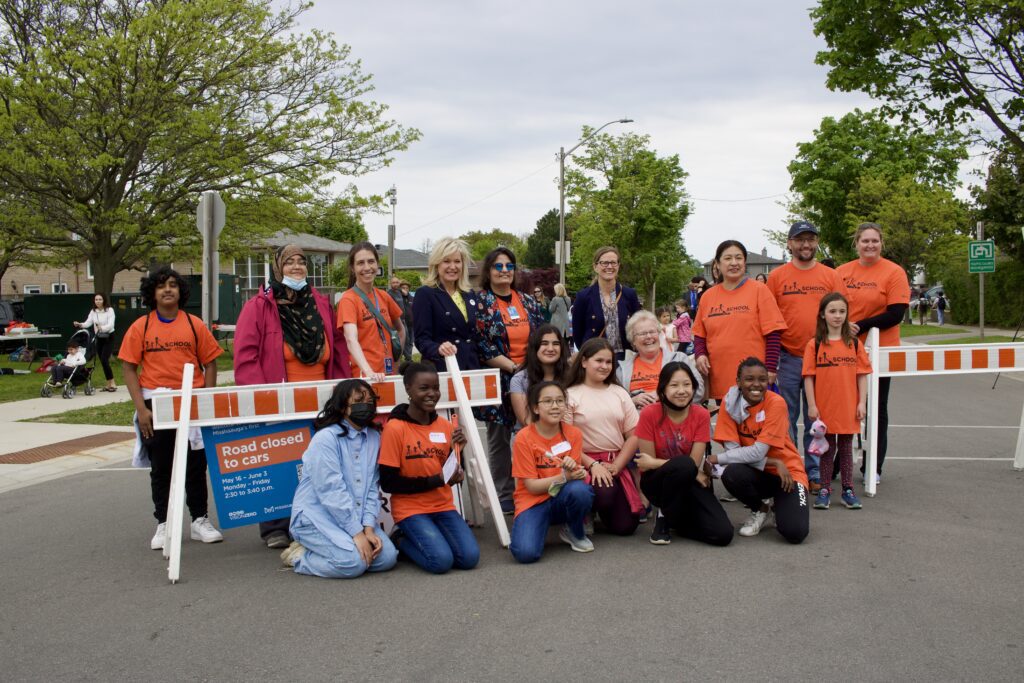
A group of elected officials, city staff, and project volunteers beside the street barriers at the City of Mississauga’s 2022 School Streets Pilot (photo by: Green Communities Canada)
Evaluation
The partner research institutions, University of Montréal (Dr. Kate Frohlich; Sonia Daly), University of British Columbia (Dr. Mariana Brussoni), Queen’s University (Dr. Patricia Collins; Carise Thompson), and Toronto Metropolitan University (Dr. Raktim Mitra), will conduct extensive evaluation of the School Streets, collecting data on the number of participants, their socio-demographic background, and their impact on rates of physical activity in children. This research will be integral to understanding the influence of such programs on communities, particularly underrepresented groups, including low-income, racialized, and new-to-Canada populations.
“Collecting key evaluative data is essential to understanding the needs and priorities of communities that have been historically underrepresented”, states Dr. Katherine Frohlich, Professor at the University of Montréal and Scientific Director of the Institute of Population and Public Health at the Canadian Institutes of Health Research. “Our evaluation activities will lead to the production of new scientific knowledge in population health intervention research, policy pathways, and recommendation reports to support the further delivery of School Streets programming across the country and potentially beyond.”
Mobilization
Public communications and knowledge mobilization activities will take place throughout the project, focusing on fostering strong local support in partner communities and establishing the public policy and funding drivers to enable sustained implementation across Canada. Public and professional audiences can expect to see resources, webinars, storytelling blogs, social media updates, photos/videos, and more. The project will culminate in a final impact report, policy pathways, and a summative in-person conference for researchers and practitioners.
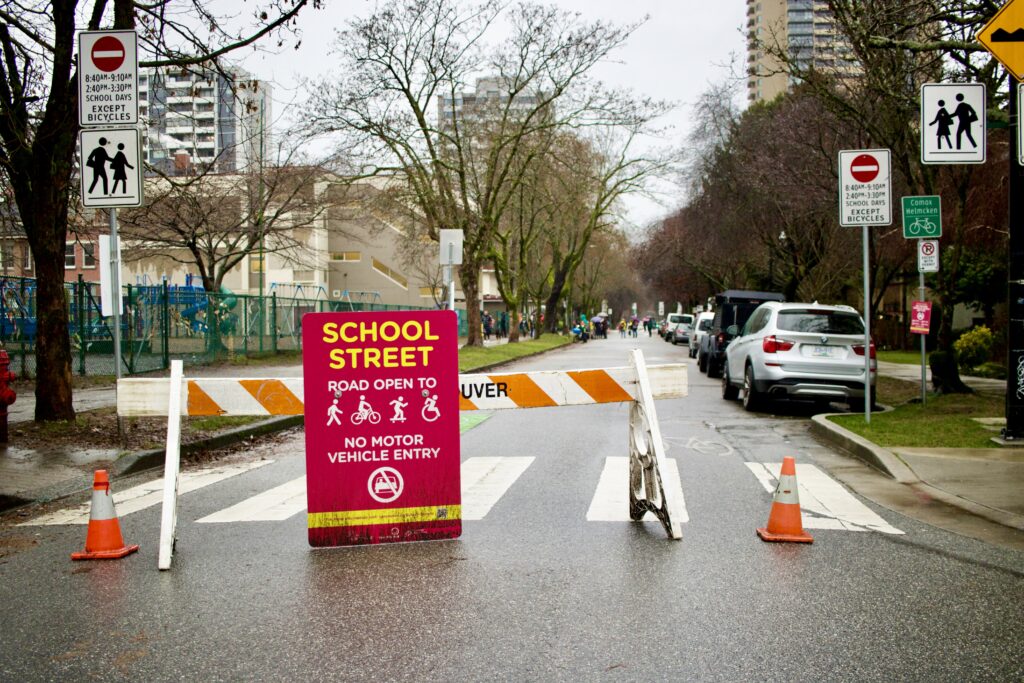
A traffic barrier at the City of Vancouver’s Comox year-round School Street (photo by: Green Communities Canada)
Future Impact
School Streets are an impactful community-led intervention that creates safer conditions for children and their families to engage in more active journeys and independent play. This national project is expected to significantly raise awareness for School Streets, build critical local capacity, and make a tangible impact in transforming school-adjacent streets across the country.
Keep an eye out for future reports, events, resources, good-news stories, and maybe even a School Street near you! Visit www.greencommunitiescanada.org/programs/school-streets/ for more information and updates.
For project information in French, please refer to the Announcement and Backgrounder.
Thank you to our funder the Public Health Agency of Canada / Merci à notre bailleur de fonds l’agence de la santé publique du Canada
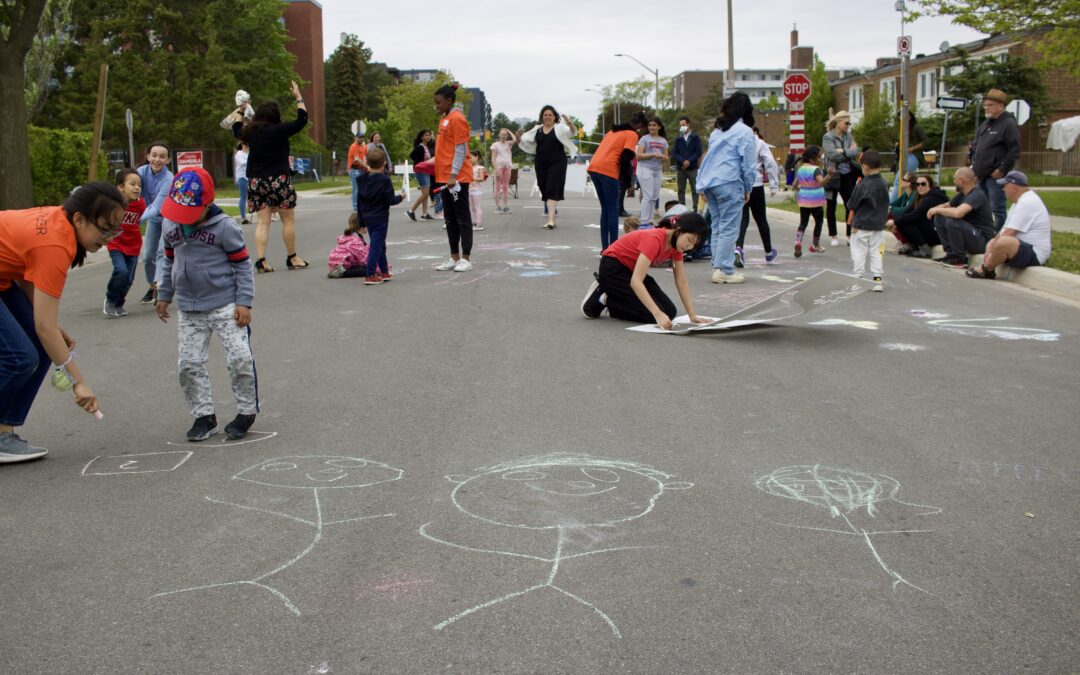
Recent Comments